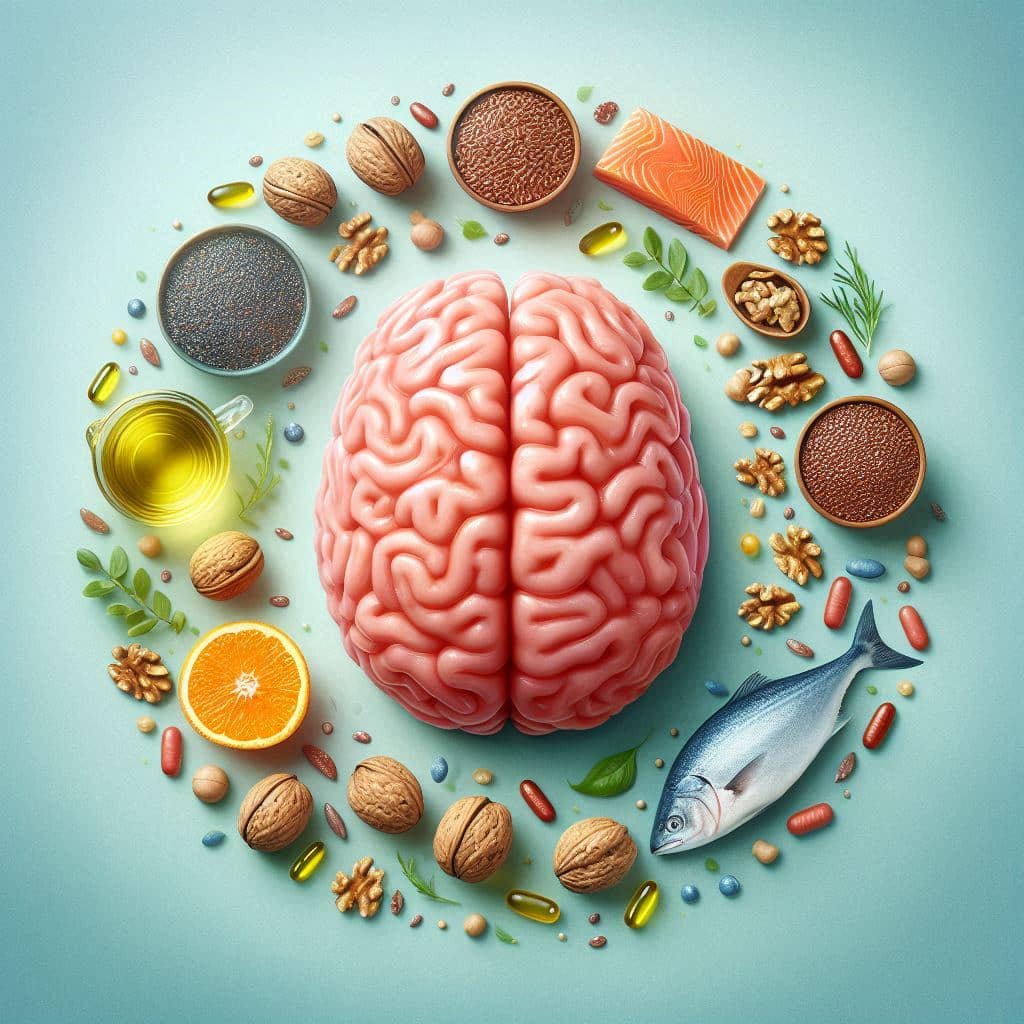In recent years, omega-3 fatty acids have gained significant attention for their numerous health benefits, particularly in supporting brain function and cognitive health. Whether you’re looking to boost memory, enhance focus, or support long-term brain health, omega-3s play a critical role in cognitive enhancement. This article explores how omega-3 fatty acids benefit the brain, the science behind their effects, and how you can incorporate them into your diet.
What Are Omega-3 Fatty Acids?
Omega-3 fatty acids are essential fats that the body cannot produce on its own, meaning they must be obtained through diet or supplementation. The three main types of omega-3s are:
- ALA (alpha-linolenic acid): Found in plant-based sources like flaxseeds, chia seeds, and walnuts.
- EPA (eicosapentaenoic acid): Predominantly found in fatty fish and marine oils.
- DHA (docosahexaenoic acid): Also abundant in fatty fish, DHA is a primary structural component of the brain.
DHA and EPA are particularly vital for brain function and are the focus when discussing omega-3 cognitive enhancement.
The Science Behind Omega-3 and Brain Health
Omega-3 fatty acids, especially DHA, are integral to maintaining the structural integrity of brain cells. Here’s how they work to enhance cognitive function:
1. Improving Brain Cell Communication
Omega-3s are a major component of the phospholipid membranes in brain cells. These membranes allow for efficient communication between neurons, which is crucial for memory, learning, and overall cognitive performance.
2. Reducing Brain Inflammation
Chronic inflammation in the brain has been linked to neurodegenerative diseases such as Alzheimer’s and Parkinson’s. Omega-3s have anti-inflammatory properties that protect brain cells from oxidative stress and inflammation, keeping the brain healthy and reducing the risk of cognitive decline.
3. Enhancing Neuroplasticity
Neuroplasticity refers to the brain’s ability to reorganize and form new neural connections. Omega-3s promote neuroplasticity, which is essential for learning new skills, adapting to new environments, and recovering from brain injuries.
4. Boosting Mental Health
Studies have shown that omega-3s, particularly EPA, play a role in reducing symptoms of depression and anxiety. A healthy mental state is closely tied to cognitive performance, making omega-3s a valuable tool for overall brain health.
Cognitive Benefits of Omega-3
Omega-3 fatty acids contribute to cognitive enhancement in several ways:
1. Improved Memory
DHA supports the hippocampus, the part of the brain responsible for memory formation. Research has shown that individuals with higher omega-3 levels tend to perform better on memory tests.
2. Increased Focus and Attention
Omega-3s enhance blood flow to the brain, improving attention span and focus. This is particularly beneficial for individuals with ADHD or other attention-related challenges.
3. Prevention of Cognitive Decline
Regular consumption of omega-3s has been linked to a reduced risk of age-related cognitive decline and dementia. DHA helps maintain brain volume and protects against the shrinkage of brain tissue as we age.
Best Sources of Omega-3 Fatty Acids
Incorporating omega-3s into your diet is one of the most effective ways to support cognitive health. Here are some of the best dietary sources:
1. Fatty Fish
Salmon, mackerel, sardines, and tuna are rich in DHA and EPA, making them some of the most potent sources of omega-3s.
2. Plant-Based Options
Flaxseeds, chia seeds, hemp seeds, and walnuts provide ALA, which the body can partially convert into DHA and EPA. However, the conversion rate is low, so these should complement, not replace, marine sources.
3. Omega-3 Fortified Foods
Eggs, milk, and some plant-based milk alternatives are fortified with omega-3s and can be a convenient way to increase your intake.
4. Supplements
Fish oil and algae-based supplements are excellent options for individuals who don’t consume enough omega-3-rich foods. Look for supplements with a good balance of DHA and EPA.
How to Incorporate Omega-3s into Your Routine
Boosting your omega-3 intake doesn’t have to be complicated. Here are some practical tips:
- Start Your Day with Omega-3s: Add ground flaxseeds or chia seeds to your morning smoothie or oatmeal.
- Choose Fatty Fish for Dinner: Incorporate salmon or mackerel into your weekly meal plan.
- Snack Smart: Walnuts make for a healthy, omega-3-rich snack.
- Try Omega-3 Supplements: If your diet lacks omega-3-rich foods, consider taking a high-quality fish oil or algae oil supplement.
Omega-3s for Different Life Stages
Omega-3 fatty acids are beneficial for cognitive health at every stage of life:
- Children and Adolescents: Omega-3s support brain development and can improve focus and learning in school-aged children.
- Adults: Regular omega-3 consumption enhances memory and concentration, helping adults stay sharp in their personal and professional lives.
- Older Adults: DHA and EPA reduce the risk of cognitive decline and support healthy aging.
Things to Keep in Mind
While omega-3s are beneficial, it’s important to consume them in balance with omega-6 fatty acids. A diet overly rich in omega-6s (found in processed foods and certain vegetable oils) can negate the benefits of omega-3s. Strive for a healthy balance by focusing on whole, unprocessed foods.
Additionally, consult a healthcare provider before starting omega-3 supplements, especially if you’re on blood-thinning medication or have other health conditions.
Conclusion
Omega-3 fatty acids are a vital component of brain health and cognitive enhancement. From improving memory and focus to preventing age-related decline, these essential fats play a powerful role in supporting the brain’s functions. By incorporating omega-3-rich foods into your diet or supplementing wisely, you can optimize your brain health and unlock your cognitive potential.
Start today by making small, intentional dietary changes and investing in your long-term brain health!
